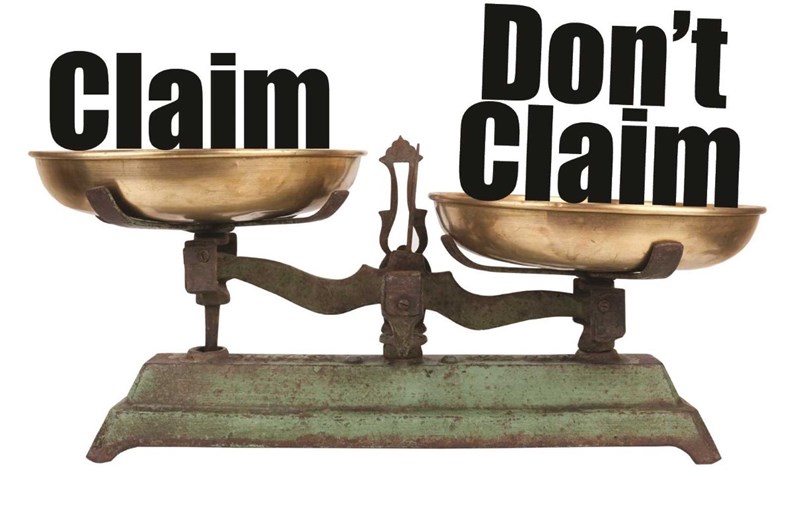Individuals, associations and other entities carry insurance coverage to protect them from liability, loss, and other financial and legal threats—that's pretty basic. What isn't always so basic is deciding when to file a claim versus paying out of pocket for a loss or damage. Paying—whether for property damage because of something like an unaddressed leak, or an injury sustained on-premises—can be very expensive, and arguably defeats the purpose of paying insurance premiums for coverage. On the other hand, a history of claims can cause a building or association to pay ever-higher premiums, or even be dropped from its insurance entirely…or so conventional wisdom tells us. Let’s in vestigate further.
Name That Claim
When deciding whether or not to claim a loss on an insurance policy, the first criterion is to determine what sort of claim it would be.
“The single largest factor to consider is legal responsibility, beyond the moral and ethical duties of the board of directors,” says Ron Sirotzki, who is with Condo Risk Specialists in Huntley. “Your association will have a declaration and bylaws which must be considered, and of course most states—including Illinois—have a Condominium Property Act. The documents spell out, usually not in plain English, who is responsible for what when these issues occur. For example, the unit owner on the second floor has a bathroom leak causing damage to the unit owner’s bathroom below. Too many times I hear the property manager or board manager say that this is a unit owner-to-owner problem. The Illinois Condominium Property Act states that the association’s insurance is ‘always’ primary when covering the unit. This means the board does not necessarily have to file a claim with their carrier but they must take the lead in remedying the situation.”
In our litigious society, this is a hard rule when it comes to injuries. Remember the case of the woman who sued McDonald’s because she got scalded by hot coffee? Anything can happen beyond the realm of insurance protection.
“In an injury situation, I advise the client to always report it to the carrier,” says Mike Bostley, senior vice president of claims for DeWitt Stern, which has offices in New York City and Chicago, even if there seems to be no harm done. "Because if you don’t, and it turns out to be a tricky case where what initially appeared to be a minor injury turns out even a year later to be something where the person needs surgery, or even if it just develops into a very high-profile case… at that point you’re jeopardizing your coverage with the insurance carrier for late notice. And to investigate it under a reservation of rights to a possible declination.”
“The first order of business is to determine whether the event that occurred is an insurance loss or a maintenance responsibility,” says Charles Keough, a partner with the law firm of Keough & Moody, P.C. in Naperville. “In a condominium association, one can ask the following two questions: Does the cost of the damage meet or exceed the association’s deductible? And, is the source of the loss covered? If the answer to either one of these questions is no, we now have a maintenance, repair and replacement issue and we must then look to the association’s governing documents. Non-condos will refer directly to the governing documents.”
In short, the professionals generally agree that the potential negatives of not filing a claim far outweigh any gain. “Should the board choose not to file a claim and pay for the repair from reserves or operating account, they could then be facing additional sudden and unexpected expenses which could have significant consequences to the budget,” says Sirotzki. “Therefore the board has been granted options on how to recover financially from the loss. The board has the option to later assess the affected unit owner or owners after a hearing.”
Indeed, the job of evaluating potential liability is part of what your insurance premiums pay for. Experts believe that liability that could go on to court could become problematic. You don’t want to end up in a situation where you have no coverage for either defense or the ultimate indemnity.
Property Claims
With respect to property claims, the decision is less cut-and-dried than with liability and is based on a certain calculus comparing the extent of the damage to the possibility of premiums being increased, or the policy being terminated outright.
There is perception that one giant claim will cause all insurance companies to avoid the claimant like the plague for years to come. This is not necessarily the case, say the experts.
“Having a frequency of small claims could be much worse than having one million-dollar claim. A lengthy history of insurance claims can come back and haunt the board with higher premiums, higher insurance deductibles and the possibility of having the insurance carrier non-renewing their insurance policy,” says Sirotzki.
“Being non-renewed could force a community association to obtain insurance through the Excess and Surplus (E&S) market. E&S is generally non-standardized policies from insurance companies not licensed to transact business in the state. It’s not regulated by the state insurance commissioner (so there’s no regulatory authority to satisfy your concerns) and any defaults (meaning no money to pay claims) are not covered by the state’s insolvency fund. And as an added bonus you will often be paying larger to substantially larger premiums for what amounts to lower quality- coverage.”
Insurance companies are very good at determining the probability of certain events happening based on data ,and it tends to be easy to predict whether one's coverage is at risk of termination. This is why it's sometimes advisable to not claim every last thing that happens—especially when there are definitely no liability issues.
"The first strategy is to determine what the amount of damages is on the claim, and that’s usually after you stop,” Bostley explains, “whether it’s a pipe leak or whatever casualty it is, and then get a contractor in to give you a repair estimate.” From there, it’s necessary to determine who is responsible to pay for what; some claims might be the responsibility of the individual shareholders or unit owners, and not the co-op or condo itself. “As an example, the building may be responsible for the plaster and a prime coat of paint, while the tenant or shareholder may be responsible for the finish coat of paint,” he says. “And that’s usually determined in the bylaws and proprietary lease.”
Then it becomes, in effect, a math problem.
Doing the Math
“When I receive a call from a board member, some of the criteria we determine together on whether or not we should file a claim is: the type of loss, the size of loss (is it above or below the deductible is any), what is the total impact or severity among the other specifics of what, why and how it happened,” says Sirotzki. “In 31 years of working with community associations, no matter how similar sounding, I can easily say that that not all claims are the same. Each claim has its own nuances, which is where an expert can help you find the best possible choice for your unique situation.”
“If the community has a history of claims, they need to make serious considerations before filing another claim,” says Tiffany Seppelfrick, CMCA, AMS, the director of suburban operations for FirstService Residential Illinois in Chicago. “They also need to consider their deductible amount versus the size of the claim. Getting dropper by their carrier, higher premiums, inability to obtain competitive rates or even difficulty obtaining insurers willing to bid are all potential ramifications of a lengthy loss history. In most cases, five $10,000 claims will have more of a negative impact on premiums than one $100,000 claim will.”
But even when the math makes perfect sense, there are scenarios in which the claim should be reported regardless, even when there are no obvious liability issues.
“It would seem that choices are black or white, either we are filing a claim or not. However there is a gray area to consider when placing your agent/broker on notice without actually proceeding with a claim,” says Sirotzki. “Paying losses out of pocket is not as simple as one may think. That small medical bill for the slip and fall incident that you decided to pay for can later turn into a larger expense with loss of wages or even ongoing medical costs. Now you could be facing tens of thousands of dollars that you did not expect to be paying for out of pocket.”
“The reality is the property manager is responsible for ensuring the community is never without insurance. The manager should always be aware of the renewal date and obtain proposals well in advance,” says Seppelfrick. “The board should be permitted plenty of time to review the proposals—at least two weeks in advance. Work closely with the board to make sure they make a decision in a timely manner. If an extenuating circumstance causes a board not to approve a renewal, always contact the existing carrier to bind coverage until a policy can be put in place.”
Insurance is all about risk assessment. So is knowing when to report a claim. When it doubt, chances are, it’s better to notify the carrier than not.
Greg Olear is a freelance writer and novelist and a frequent contributor to The Chicagoland Cooperator. Staff writer Christy Smith-Sloman contributed to this article.







Leave a Comment